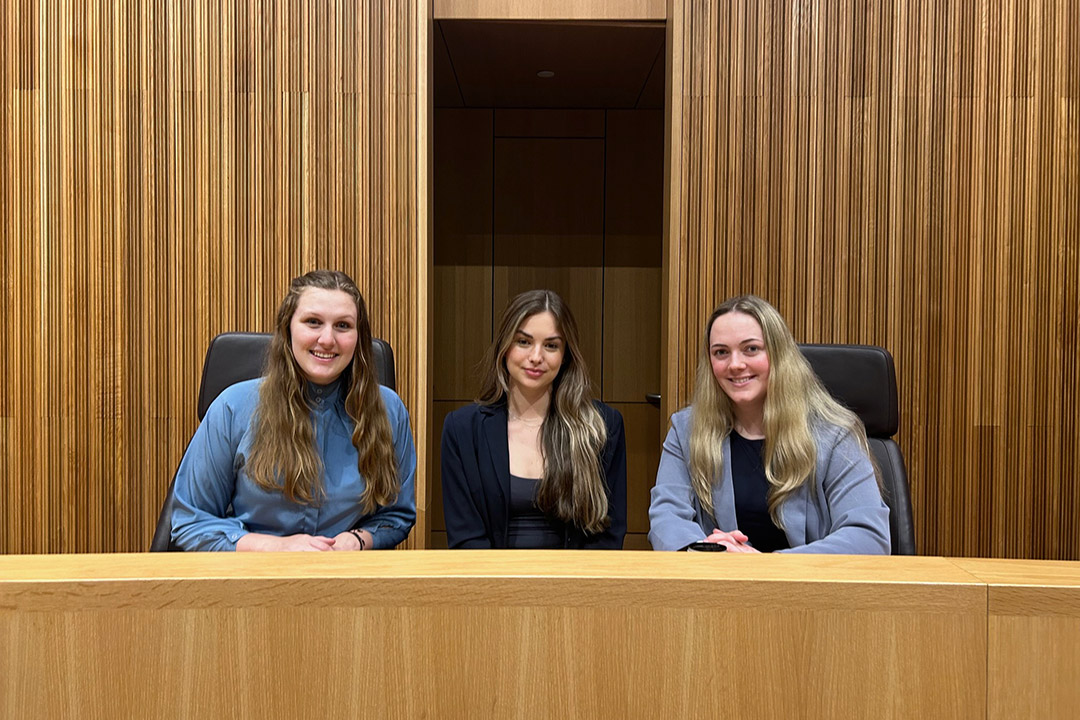3+3 law program celebrates first cohort of graduates and expanded program offerings
Provided
Megan Hartman, left, Kaitlin Sommer, center, and Kate Hickey, right, will continue studying law at Syracuse University with the goal of graduating with their Juris Doctors in 2026.
The path to obtaining a law degree typically requires at least seven years in higher education. However, students enrolled in RIT’s Accelerated 3+3 Law program are able to shave a year off of their journey and get a head start on establishing their career in law.
This May, fourth-year students Megan Hartman, Kate Hickey, Kaitlin Sommer, and Ella Walton will simultaneously graduate from RIT and complete their first year of law school, making them the program’s first cohort to fully transition from their undergraduate studies at RIT to their legal studies Syracuse University College of Law.
Hartman, from San Diego, Calif., pursued a double major in sociology and anthropology and public policy while at RIT. She explained that participating in the program gave her an advantage on her journey toward becoming an attorney.
“This field is notoriously competitive, and there are issues surrounding artificial intelligence and a possible next-generation bar exam that are shaking things up, so you need that competitive edge to power you through,” said Hartman. “We’ll also have a head start when it comes to applying for jobs. It will take time to get up to the more prestigious job titles, but I’ll be starting that journey when I’m 24. Many people don’t complete their law degree until their early 30s.”
Hickey, an international and global studies and public policy double major from Halifax, Mass., added that the guidance that came with enrolling in the program helped build her confidence prior to starting her first year of law school.
“There were a lot of people in our class who struggled the first few months because they didn’t have experience reading cases or things like that. While at RIT, I attended some of the RIT Pre-Law Society events where alumni would come in and run mock law classes with us, so I had some idea of what to expect going into my first year at Syracuse,” said Hickey. “I think that the confidence I had knowing that I already sat through similar classes and was able to succeed really helped prepare me.”
Looking beyond law school, Hickey and Hartman both have visions for their future careers. Hickey aims to work in the national security and counter-terrorism law sector, and Hartman is interested in becoming a litigator and working in the government sector. Both students extend their gratitude to Jennifer Gaylord, pre-professional studies coordinator and academic advisor, and the many RIT alumni who worked with the RIT Pre-Law Society and the 3+3 program students and helped them succeed in their studies.
As the program celebrates the first cohort of graduates, leadership in the College of Liberal Arts, where the program is housed, also announced that the 3+3 program is expanding through a new partnership with University at Buffalo School of Law. Qualified undergraduate students at RIT will have the opportunity to choose between pursuing their law degree at Syracuse University or at the University at Buffalo starting in fall 2024.
“Accelerated degree pathways can be invaluable for students who are hoping to streamline their education. Partnering with the University at Buffalo School of Law will provide more options for our students as they work toward law school,” said Kelly Norris Martin, interim dean of RIT’s College of Liberal Arts. “Having a plan in place that can save students both time and money is a clear benefit, but participating in the program can also provide some guidance as they navigate the world of higher education and ensure that they have the foundation they need to succeed in their career goals.”
To be eligible to apply to University at Buffalo School of Law, undergraduate students at RIT must have completed a minimum of 90 credits by the end of their third year of undergraduate studies; earned a cumulative undergraduate GPA of 3.5 or higher; and successfully completed the Law School Admission Test (LSAT) with an LSAT score at or above the median LSAT score for the School of Law’s previous year’s enrolled class, or a GRE score at or above the 70th percentile on Verbal Reasoning and 40th percentile on Quantitative Reasoning.
For more information, go to the 3+3 law program webpage or contact Jennifer Gaylord at jmggla@rit.edu.




